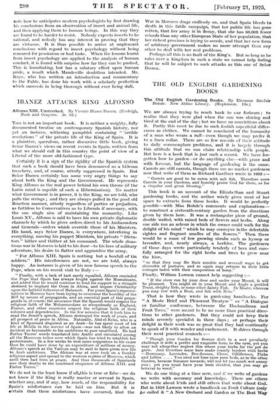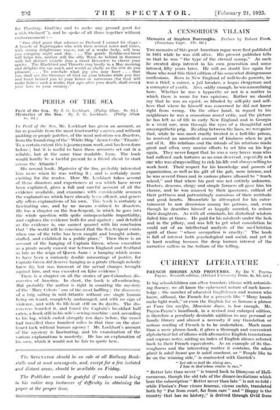THE OLD ENGLISH GARDENING BOOKS
The Old English Gardening Books. By Eleanour Sinclair
• Rolide. New Aldine Library. (Hopkinson. 15s.)
WE are always trying - to reach back to cur forbears ; to realize that they were glad when the sun was shining and tired at the end of the day ; but we have no convictions about it. Partly this must be due to such foolish superficial differ- ences as clothes. We cannot be convinced of the htimanity of a man who wears a ruff--even though we may prefer it to a linen collar. There are so few records of their attitude to daily commonplaCe prabknis, 'and it. is largely through this attitude that we can claim relationship with people. But here is a book that is just such a record. We have for- gotten how to garden—or -do anything else—with grace and with fervour, but the language of gardening is the same. Carrots are still carrots, though there are no market gardeners now that write of them as Richard Gardiner wrote in 1603 :— " Carrots are good to be eaten with salt fish. Therefore sowe Carrots in your Gardens, and humbly praise God for thorn, as for
• a singular and great blessing."
This book is an account of the Elizabethan and Stuart gardening' books, and the author wisely gives most of her space to extracts from those books. It would be perfectly possible—with Miss Rohde's comments and explanations— to construct a sixteenth-century garden from the directions given by them here. It was a rectangular piece of ground, double walled, with -raised beds of flowers and herbs. Along one side ran an arbour in which the owner could walk for the delight of his mind " which he Iney eoneeyve in the delectable sightes and fragrant smelles of the flowers." Then there would be a maze of low growing shrubs such as hyssop or lavender, and, nearly always, a beehive. The gardeners of those days wrote particularly tenderly cf bees and care- fully arranged for the right herbs and trees to grow -near the hive, " so that they may flue their sundrie and severall ways to get diversitie of pastures, and so again may returns to their little cottages laden with their composition of hony."
Finally, William Lawson cannot help suggeSting :- " If the river run by your door and under your Mount, it will be pleasant. You might sit in your Mount and Angle a pockled Trout, sleighty Eele, or some other dainty 'Fish. 'Or lioate, whereon you may row with a Boat, and fish with Nets."
That is how they wrote in gardening handbooks. For " A Moste Brief and Pleasaunt Treaty se " er " A Dialogue or familiar conference, betweene the husbandman and Fruit Trees," were meant to be no more than practical direc- tions to other gardeners. But they could not keep their minds severely specialist in those days .; or perhaps their delight in their work was so great that they had continually to speak of it with wonder and-excitement. It shines through their most practical counsels :— " Though your Garden for flowers doth in a sort peculiarly challenge it selfe a perfits and oiqthsite -form to 'the eyes, yet you may not altogether neglect this where your herbs for the pot do grow. And therefore some here make comely borders with herbs —Rosemary, Lavender, Bee-flowers, Clove, Gilliflowers, Pinks and Lillies. . . . You need not hate raise your beds, as in the other Garden, because Summer towards, will not let too much wet annoy you : yet you must have your beds divided, that you may go betwixt to weed."
We do one thing at a time now, and if we write of gardens we write with accuracy and knowledge. There are others who write about birds and still others that write about God. But -in 1618 Lawson wrote a handbook on Fruit Culture (only be called it " A New Orchard and Garden or The Zest Wiky
for Planting, Grafting and to make any ground good for a rich Orchard"), and he spoke of all three together without
embarrassment :--
" One chief grace that adornes as Orchard I cannot let slippe : A broode of Nightingales who with their several notes and tunes, with strong delightsome voyce, out of a weake body, will bear you company night and day. . . . The gentle Robbin-red-brest will helpe her, neither will the silly Wren be behind in Summer with her distinct whistle (like a sweet Recorder) to cheere your spirits. The Blackbird and Throstle sing loudly in a May morning and delights the ear much and would as gladly as the rest do you pleasure. . . . To conclude what joy you may have . . . that you shall see the blessings of Cod on your labours while you live and leave behind you to your heires or successors (for God- will make heires) such a worke, that ages after your death, shall record your love to your country."











































 Previous page
Previous page